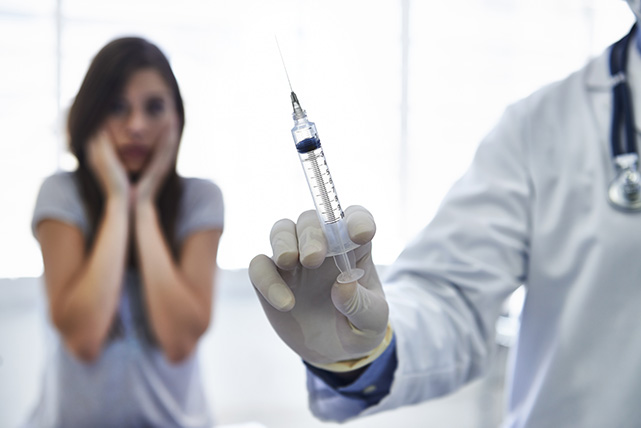Needle phobia, also known as trypanophobia, is an extreme fear of medical procedures that involve injections or needles. If you have ever experienced anxiety prior to the flu shot, while watching others receive injections, or in some cases even hearing or reading about these procedures, you may have some level of needle phobia. Needle phobia affects around 20% of the adult population to such an extent that it can cause the avoidance of medical care.
There are several possible reasons why some people may develop phobias to needles and others do not. Certain factors might include early childhood trauma brought on by a medical procedure or a family history of needle phobia. Additionally, the medical predisposition towards having a vasovagal response (fainting or dizziness) when pricked by a needle appears to increase the likelihood of developing a needle phobia. Finally, research indicates that individuals who are highly sensitive to pain are also more likely to have a needle phobia.
The symptoms of needle phobia can greatly interfere with a person’s quality of life and their health. These symptoms are present when a person sees a needle or when they are told they need a medical procedure with a needle. Symptoms include:
- Fainting
- Dizziness
- Anxiety
- Panic attacks
- Racing heart
- Avoiding medical care
Considering what we know about individuals with needle phobia, we can be pretty certain that there is a group of people who are currently experiencing anxiety when anticipating their turn for the Covid-19 vaccine. The positive news is that there is a good prognosis for this disorder and therapy can help.
Cognitive Behavioral Therapy (CBT). CBT for needle phobia involves examining your fear of needles in therapy sessions and learning different strategies to cope with anxiety. Put simply, your therapist will help you identify your anxious thoughts and help you challenge them to become more balanced thinking. CBT targets coping with the physical feelings of anxiety, modifying dysfunctional thoughts, and challenging the pattern of avoidance.
Exposure Therapy. Exposure Therapy is used in conjunction with CBT and focuses on your thoughts on feelings related to needle phobia. Your therapist will help you establish a fear ladder in which you determine the amount of distress associated with each step. For example, you may first view photos of needles, then stand next to a needle, then imagine an injection, and so on. The final step would be to receive your own injection.
If your physician is recommending that you are a good candidate for any vaccination, but you are struggling with anxiety related to needle phobia, the above treatments can be very effective in helping you reach your goal.

